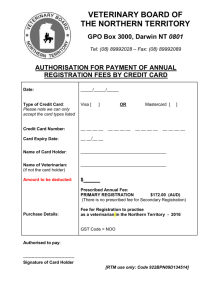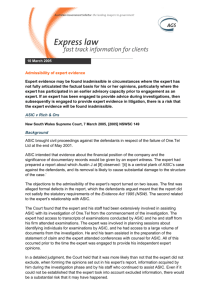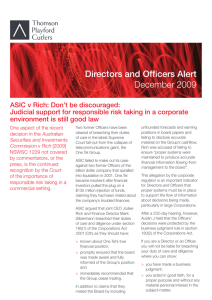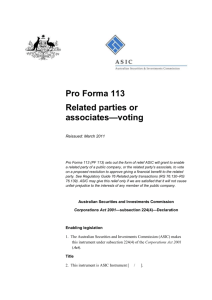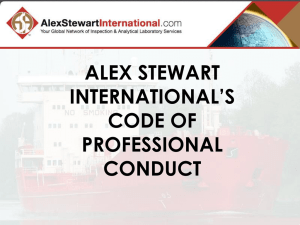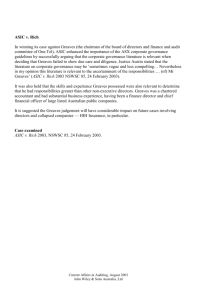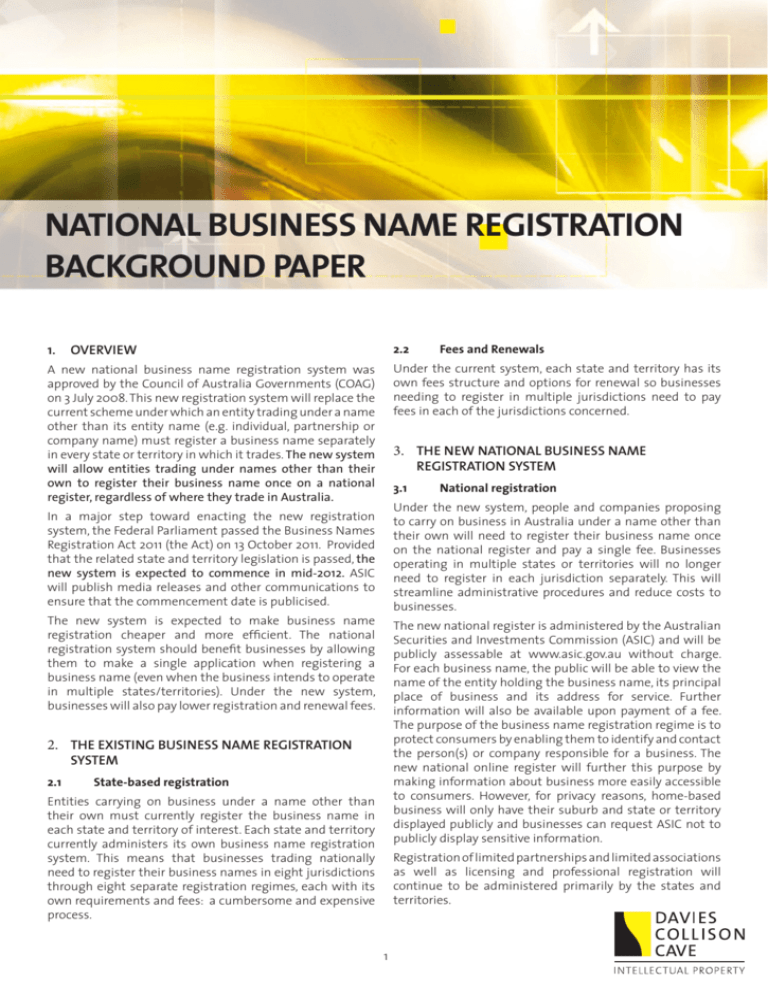
NATIONAL BUSINESS NAME REGISTRATION
BACKGROUND PAPER
1. OVERVIEW
2.2
A new national business name registration system was
approved by the Council of Australia Governments (COAG)
on 3 July 2008. This new registration system will replace the
current scheme under which an entity trading under a name
other than its entity name (e.g. individual, partnership or
company name) must register a business name separately
in every state or territory in which it trades. The new system
will allow entities trading under names other than their
own to register their business name once on a national
register, regardless of where they trade in Australia.
Under the current system, each state and territory has its
own fees structure and options for renewal so businesses
needing to register in multiple jurisdictions need to pay
fees in each of the jurisdictions concerned.
3. THE NEW NATIONAL BUSINESS NAME
REGISTRATION SYSTEM
3.1
National registration
Under the new system, people and companies proposing
to carry on business in Australia under a name other than
their own will need to register their business name once
on the national register and pay a single fee. Businesses
operating in multiple states or territories will no longer
need to register in each jurisdiction separately. This will
streamline administrative procedures and reduce costs to
businesses.
In a major step toward enacting the new registration
system, the Federal Parliament passed the Business Names
Registration Act 2011 (the Act) on 13 October 2011. Provided
that the related state and territory legislation is passed, the
new system is expected to commence in mid-2012. ASIC
will publish media releases and other communications to
ensure that the commencement date is publicised.
The new system is expected to make business name
registration cheaper and more efficient. The national
registration system should benefit businesses by allowing
them to make a single application when registering a
business name (even when the business intends to operate
in multiple states/territories). Under the new system,
businesses will also pay lower registration and renewal fees.
The new national register is administered by the Australian
Securities and Investments Commission (ASIC) and will be
publicly assessable at www.asic.gov.au without charge.
For each business name, the public will be able to view the
name of the entity holding the business name, its principal
place of business and its address for service. Further
information will also be available upon payment of a fee.
The purpose of the business name registration regime is to
protect consumers by enabling them to identify and contact
the person(s) or company responsible for a business. The
new national online register will further this purpose by
making information about business more easily accessible
to consumers. However, for privacy reasons, home-based
business will only have their suburb and state or territory
displayed publicly and businesses can request ASIC not to
publicly display sensitive information.
2. THE EXISTING BUSINESS NAME REGISTRATION
SYSTEM
2.1
Fees and Renewals
State-based registration
Entities carrying on business under a name other than
their own must currently register the business name in
each state and territory of interest. Each state and territory
currently administers its own business name registration
system. This means that businesses trading nationally
need to register their business names in eight jurisdictions
through eight separate registration regimes, each with its
own requirements and fees: a cumbersome and expensive
process.
Registration of limited partnerships and limited associations
as well as licensing and professional registration will
continue to be administered primarily by the states and
territories.
1
3.2
Existing business names
form. Partnerships and unincorporated associations can
nominate a principal contact to act on their behalf in
dealings with ASIC. Applicants can alternatively nominate
an ASIC Registered Agent to lodge an application on their
behalf.
Business names registered under the old system do not
need to be re-registered. All existing business names will be
automatically transferred to the new national system upon
its commencement. Existing business name holders will be
able to review and check the details that will be displayed
on the public register at www.search.asic.gov.au.
3.5
An entity applying to register a business name will have to
disclose to ASIC:
Where the same business name is registered in more
than one jurisdiction by different entities, ASIC may add
a geographic identifier or other distinguishing mark or
expression to each duplicate business name. While the
geographic identifier or other mark will appear on the
register, the business name will not change and the holder
will not need to change the name in use. A new business
name cannot be registered if it is identical or nearly
identical to the registered business name alone or the
name with the distinguishing mark added. For example,
‘Jane Doe Pharmacy’ might be currently registered in both
Melbourne and Sydney. Under the new system, ASIC may
add the identifying marks ‘(Melbourne)’ and ‘(Sydney)’ to
the respective business names on the register. However,
both businesses will be able to continue trading as ‘Jane
Doe Pharmacy’. In such a case, new applicants would not
be able to register ‘Jane Doe Pharmacy’, ‘Jane Doe Pharmacy
Melbourne’ or ‘Jane Doe Pharmacy Sydney’ or any business
names nearly identical to those names.
(a) details sufficient to identify the business entity;
(b) the entity’s ABN, or a statement to the effect that an
application for an ABN is pending and the reference
number for the ABN application;
(c) the address of the entity’s principle place of business
in Australia;
(d) an address for service in Australia;
(e) the business name the entity seeks to register; and
(f) the applicant’s place and date of birth where
applicable.
If the application is accepted, the entity will have an
ongoing obligation to notify ASIC of changes to the above
information within 28 days after becoming aware of them.
Unlike the situation under the current system, applicants
under the new system will be required to have an ABN or
be in the process of applying for an ABN and must not have
been refused an ABN. The new business name register will
be combined with the current ABN register administered
by ASIC. When the system commences, applicants will be
able to register for an ABN and a business name in a single
integrated online registration process through www.abr.
gov.au. Registration of an ABN will remain free. While the
ABN application is being processed (which may take up
to 28 days), the status of the business name application
will remain ‘pending’. During this time, no one else will be
able to register the same business name. Once the ABN is
allocated, the business name will be registered. However, if
the ABN has not been allocated with 28 days, the business
name application will be cancelled. Applicants who already
have an ABN will be able to seek registration of a business
name at www.asic.gov.au.
Where a business has the same business name registered
in two states, but registered on different dates, ASIC will
advise the business that the business names will be merged
into one entry on the national register. The renewal date
will be the latest renewal date of all the identical business
names. Where the same entity holds different business
names in different states under the current system, all of
the business names will be transferred to the new national
system. However, an entity can elect to cancel any names
that it no longer intends to trade under.
While applicants under the new system are required to have
or be in the process of applying for an Australian Business
Number (ABN), holders of business names registered under
the old system will still be able to renew their registration
without an ABN.
3.3
How to apply
Applicants will also only be required to nominate
one principal place of business in Australia. This is an
improvement on the current situation under which an
applicant has to nominate a principal place of business in
each state and territory in which the name is used. Many
businesses do not have offices in all the jurisdictions
of interest in which case a third party such as a law firm
with an address in the appropriate state or territory has
to be engaged to provide a local address and this incurs
additional cost.
Businesses will be able apply online to register their
business name at any time. For applicants who do not
have access to the internet, the online national business
names service will be available through government service
centres across Australia, including the offices of ASIC, the
Australian Tax Office (ATO), designated state or territory
agency offices, business enterprise centres and small
business centres. Alternatively, a paper-based application
form can be completed and mailed to the Register at ASIC’s
headquarters. For alternative methods of registration,
applicants will be able to call ASIC on 1300 300 630.
3.4
What information do applicants need to provide?
3.6
Choosing a business name
A business name cannot be registered if:
Who can apply?
(a) it is identical, or nearly identical to, an already
registered company or business name;
A person who is legally responsible for the business or
the business’ nominated qualified business advisor (e.g.
an accountant or solicitor) can complete the application
(b) it contains restricted words or expressions (e.g.
Anzac);
2
(c) it has been determined by the Minister to be an
undesirable name;
and territories (except the Northern Territory). This is
possible because the system is more efficient and less
administratively burdensome than the current system.
Further, businesses will only need to pay one fee upon
registration, instead of paying a fee in each state and
territory of interest.
(d) it is likely to be offensive; or
(e) it is likely to mislead or deceive.
The online system will provide information on and links
to the Australian trade mark database (ATMOSS) and
domain name databases. In particular, it will highlight the
fact that registration does not give proprietary rights to a
business name. Many individuals and companies believe
that registration of a business name provides proprietary
or exclusive rights to use of the name. However, registering
a business name does not confer rights to prevent other
traders from carrying on business under the same name,
registering the name as a trade mark, or using the name
as part of a domain name. Furthermore, registration of
a business name does not provide a defence to any legal
claims. Just like the present situation, under the new
national registration system, applicants will need to be
careful not to use a business name in a way which infringes
a registered trade mark or is otherwise misleading or
deceptive. Determining whether use of a business name
may constitute trade mark infringement, passing off or
misleading and deceptive conduct can involve complex
legal issues with important ramifications. The new system
does not simplify these issues but at least flags them for
consideration.
Applicants will be able to choose between registering for a
one-year period (for a fee of $30) or for a three-year period
(for a fee of $70). The appropriate fee will be payable by
BPay, Australia Post BillPay, Visa, or Mastercard. The business
name will not be registered until the fee is received. If the
fee is not received by ASIC within 10 business days, the
application will be cancelled. If an application is rejected
and the fee has already been paid, ASIC will refund the fee.
3.9Renewals
For business names registered under the current system,
the renewal period will not change. Renewals will continue
to be issued by the States and Territories up until the
commencement of the new system. Holders of business
names registered under the new system will be able to
choose to renew their business name for one year (for a fee
of $30) or three years (for a fee of $70). These renewal fees
are lower that the current fees in all states and territories
except the Northern Territory. ASIC will issue renewal
reminders to holders of registered business name prior to
the expiration date.
The online application system will also warn applicants
seeking to register a name incorporating a reference to a
protected title (e.g. doctor or solicitor) that use of such titles
must comply with state or territory laws. While registration
of a franchise name will not require the applicant to
provide ASIC with the written permission of the franchisor,
the online system will warn applicants for registration of
franchise names that they need to have been authorised to
trade under the name by the franchisor.
3.10
Appeal process
If an application to register a business name is rejected, the
applicant will have 28 days to request review of the decision
by ASIC. There is no fee for a review. ASIC will review whether
the application satisfied the requirements set out above.
If not satisfied by the review, applicants will be able to
appeal ASIC’s decision to the Administrative Appeal Tribunal
(AAT). The cost of appeal is $777, but the majority of that fee
may be refunded if the applicant is successful.
3.7Acceptance
When an applicant submits an application online, an
automated program will be used to determine whether
the name can be registered. The purpose of this method
is to expedite the business name registration process.
However, as discussed below, there are significant practical
implications which arise from the automated process.
3.11
Third-party objections
A third-party can seek review of ASIC’s decision to register a
business name if:
(a) the third-party is an entity facing a real risk of
substantial detriment due to registration of the
business name;
After submitting an application online, applicants will either
receive instantaneous confirmation of the registration
(including a payment advice and a Business Name Extract)
or a message stating that the name cannot be registered. If
the business name cannot be registered, the online system
will provide a reason and permit the applicant to choose
another business name.
(b) the business name was not carried over to the
national register from one of the old state or
territory registers; and
(c) the application for review is received by ASIC within
15 months of the date the business name was
registered, or a longer period allowed by ASIC.
Business names will be available on a first come, first serve
basis. Where two or more applications are lodged with ASIC
for registration of identical or nearly identical names, the
application lodged first will take priority.
3.12
Offences and Penalties
It is an offence under the Act for an entity to carry on a
business under a name which is not the entity’s name or its
registered business name. The penalty for breach is $3,300.
3.8Fees
An entity carrying on a business under a business name
will be required to include its business name and ABN (if
any) in written communications with other entities, if the
The fee for business name registration under the new
system will be less than the fees charged by the states
3
communication is connected with carrying on the business.
The entity will also have to display the business name
prominently at every place where it carries on business in
public. The penalty for breach of either requirement is $550.
ASIC will have the power to cancel a business name,
providing it gives 28 days’ notice to the holder, if:
(a) the holder fails to pay the renewal fee when due;
(b) the holder does not trade under the business name
for three months;
(c) the business name is used in infringement of a
registered trade mark;
(d) the holder fails to satisfy a condition of registration;
(e) the holder fails to provide ASIC with information it
is obligated to provide;
(f) the holder becomes disqualified from running the
business; or
(g) ASIC becomes aware of a matter which would have
led ASIC not to register the business name at the
date of registration.
3.13Transition
The states and territories will finalise any applications,
renewals, reviews and appeals that commenced before
the new national system becomes operational. Once the
national register commences, all new transactions will be
handled by ASIC.
4. PRACTICAL IMPLICATIONS
4.1
Availability of Business Names
Critics of the new system have observed that fewer
business names will be available than under the current
system, because business names which are identical
or nearly identical to an already registered company or
business name cannot be registered. However, this is
unlikely to have much practical significance for businesses.
Some businesses may just need to be more creative with
their choice of business names. For example, in spite of the
restrictions and challenges which might be encountered
under the Trade Mark Act 1995 (Cth) trade mark applicants
still have a high success rate.
4.2
Trade mark infringement and passing-off
Since business name registrants will in many cases
be notified that the name has been registered with a
geographical identifier, the new system may highlight the
potential for disputes in some instances.
Before businesses invest time and money into developing
and registering a business name, advice as to whether
use of the business name may constitute trade mark
infringement, passing-off or misleading and deceptive
conduct should be sought.
IP Australia provides general information on trade marks
and a free, public trade mark database (ATMOSS) through
its website at www.ipaustralia.gov.au. However, given
the complexity of trade mark law, businesses should seek
professional advice from a registered trade mark attorney or
intellectual property solicitor. Business name owners should
seek registration of their names as trade marks where
appropriate and should monitor for conflicting trade mark
registration applications. After a trade mark application
is advertised as accepted, any person who considers that
the trade mark should not be registered can oppose its
registration within the following three months. Businesses
should consider seeking registration under the Trade Marks
Act 1995 (Cth) before the new system commences.
4.3
Cancellation for non-use of business name
As discussed above, ASIC will have the power to cancel a
business name and remove it from the register if the holder
does not trade under the business name for three months.
This power is designed to stop businesses from registering
business names for defensive or strategic purposes for the
purpose of impeding registration by third parties and to
free up unused names for adoption by others. However,
the application process does not require businesses to
show use at the time of application or renewal. Subject to
renewal, many unused business names effectively remain
registered indefinitely.
4.4
Identical and nearly identical business names
Whether a business name application is rejected because it
is identical or “nearly identical” to a prior registered business
name will be determined electronically at first instance. In
theory, while this may create an objective and consistent
process, it is also likely to lack flexibility and the criteria for
determining “nearly identical” remain to be seen at this
stage. It will clearly be important for the review process to
be readily accessible, transparent and efficient.
Authors:
Brett Lewis, Partner
Alexa Kostenko, Summer Clerk
Davies Collison Cave
Melbourne
For further information or advice on business
name registration or any other trade mark
related matter please call Brett Lewis on
03 9254 2777
Copyright © 2012 Davies Collison Cave, all rights reserved.


